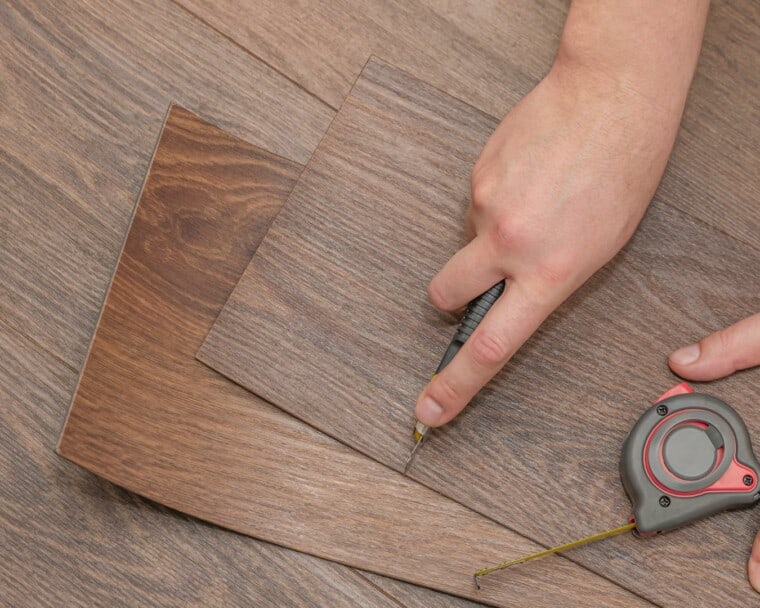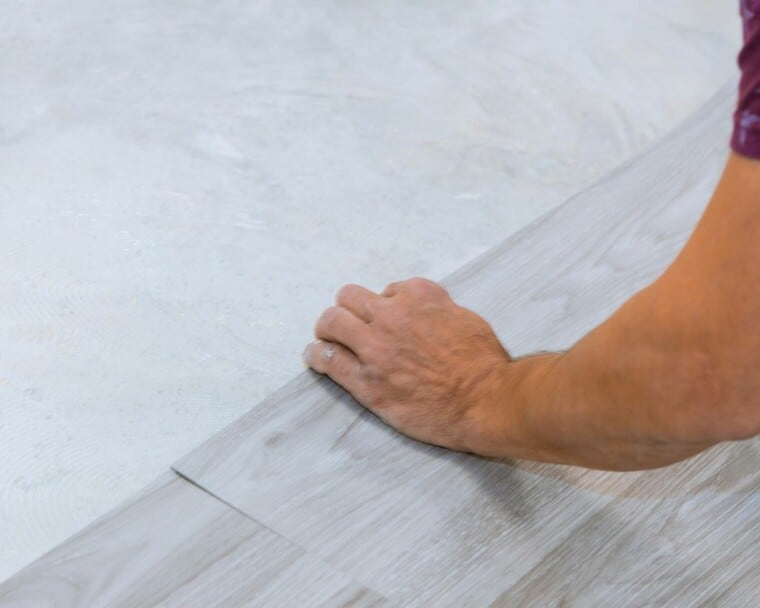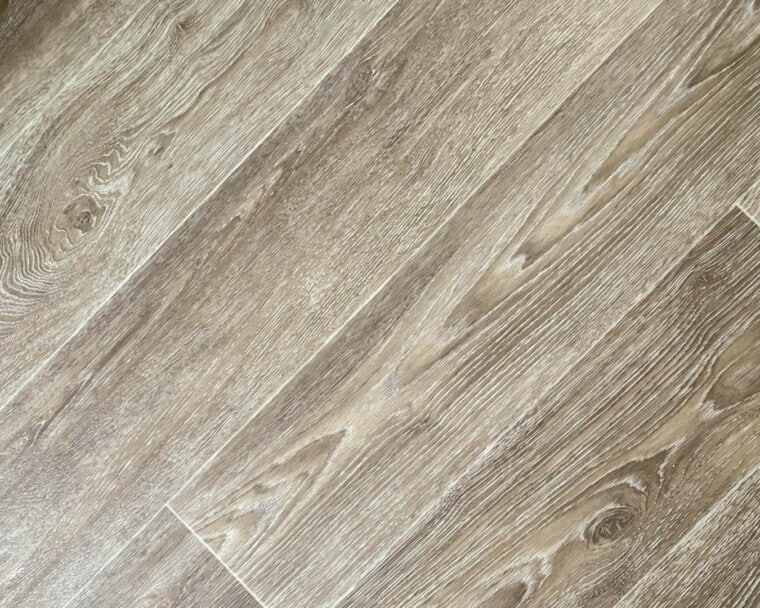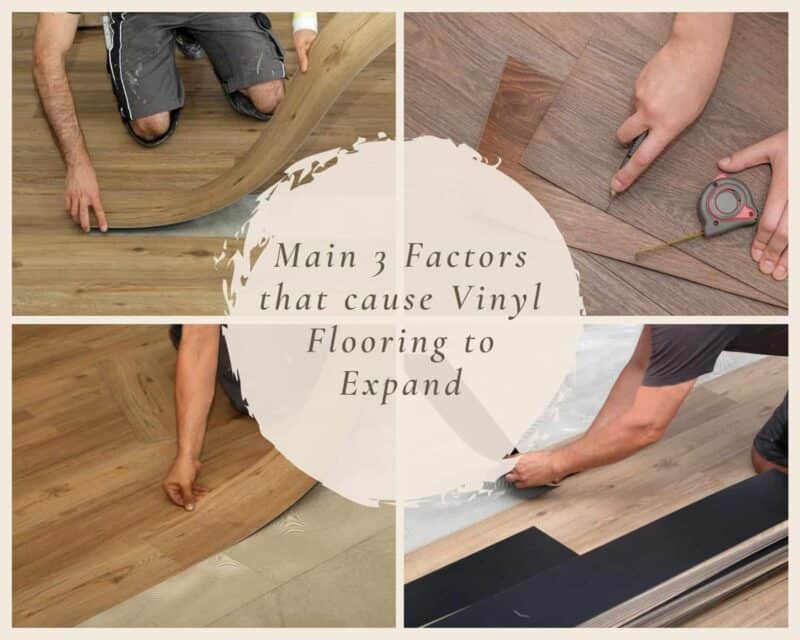Main 3 Factors that cause Vinyl Flooring to Expand
Vinyl flooring is an inexpensive and easy-to-install option used in various home decorating styles. It’s also durable and can last for years if properly cared for. However, vinyl flooring has some limitations you should know about before deciding to use it. This article discusses more vinyl flooring and whether it expands.
Does Vinyl Flooring Expand?
Vinyl flooring will expand and contract with temperature changes. When the temperature drops, vinyl floors can shrink and wrinkle-causing them to crack. This is especially true if your home has concrete slab floors that are not heated or cooled correctly.
Vinyl flooring will expand and contract with moisture changes. Moisture in the air on a sunny day can cause vinyl floors to swell up over time. The water evaporates from them when they’re exposed to sunlight during warmer weather months.

How do I Prevent an Expansion Gap in Vinyl Flooring?
There are a few ways to prevent an expansion gap in vinyl flooring.
Use Expansion Joints through along perimeter of your room
An expansion joint is a small piece of material that joins two pieces of vinyl flooring together. It can be installed at the corners of your room or anywhere else where there is movement. If you have an existing room with cracks installing an expansion joint will help fill those spaces.
Use Weather Stripping
This type of material is used under doors and windows during installation. It also helps seal gaps where water would otherwise seep under doorways during winter.
Why Does Vinyl Flooring Expand and Contract?
When it comes to vinyl flooring, the expansion and contraction you experience are due to a few factors. Let’s see the main 3 factors that cause buckling:
Vapor pressure
The vapor pressure causes them to expand or contract depending on the temperature and humidity levels. This is because hot air contains more moisture than cold air does affect how easily water evaporates from a material like vinyl.
Temperature Fluctuations
These are caused by changes in weather and heating/cooling systems. They can also be exacerbated by condensation on your vinyl flooring if you have a humid climate.
Foot Traffic
Foot traffic can cause the floor to expand, crack and become uneven. This is especially true if you have a lot of foot traffic in your home. When people walk on vinyl floors, they will leave footprints behind them, which cause the floor to expand or contract.
How to Prevent Expansion and Contraction of Vinyl Floors
You can prevent or limit the expansion and contraction of vinyl floors by following a few simple rules:
1. Keep your vinyl flooring away from water
When installing vinyl flooring in your home, keeping certain things in mind is essential. For example, don’t install it near a pool or spa. It’s also best to avoid putting vinyl flooring in bathrooms as well.
2. Ensure there are no grease residues on the subfloor
If you’re using cooking oil or butter, don’t use it! If you’ve been using cooking spray, its residue may be absorbed into the wood fibers of your subfloor. This may cause problems down the line when installing vinyl flooring overtop. It’s also important not to use other oils because they can leave behind a greasy film.
3. Use anti-skid underlayment
You must choose a product made from rubber or plastic. If the subfloor underneath your vinyl planks is not sound, replace it with one that can take the weight of heavy furniture. If there’s no other way around this problem, then try using adhesive instead of nails in between each plank.
4. Don’t drag heavy furniture
Instead, use furniture pads or glides to protect the floor from scratches and dents. If you’re moving furniture, try moving it on rollers instead of dragging it across the room by hand.
If you are going to put down vinyl flooring in your home, be sure to check with the manufacturer to make sure that it can be installed on a carpet pad. If you do use a pad and your carpet is not compatible with the vinyl flooring, there may be some problems with expansion and contraction.
5. The location of your house
At times, houses have different temperatures than their surroundings. This can cause problems for those who are planning to move into them soon after the installation of new flood the ring. You should also take note of whether or not there are any sources of moisture in your home that could cause issues
6. Use a flooring primer that contains a natural rubber base
You can find these products at any home improvement store. They work by filling the gaps between your flooring, preventing it from expanding and contracting during temperature changes.

How to Fix Problems with Vinyl Plank Flooring
If you have any problems with your vinyl plank flooring, here are some tips to fix them:
The moderate moisture level of the subfloor and room
The moisture level of the room and subfloor is important when deciding whether or not vinyl flooring will expand. If you have a dry room, use a humidifier to keep it from getting too dry. If your home’s foundation has an existing moisture problem then use a dehumidifier to ensure that there is enough humidity.
Trim the vinyl planks along your walls
Trimming the vinyl planks along your walls is an easy way to create a beautiful look. You can trim the vinyl planks to fit around obstacles or make them into a pattern.
Do essential maintenance on your vinyl floor
You can do a lot to help your vinyl flooring maintain its appearance and durability by following these simple rules:
Practice proper ventilation
Ventilation is an important aspect of vinyl flooring. The room must be well-ventilated, and you should keep the windows and doors open. You can also install a dehumidifier, which will help to make sure that there is plenty of air circulation in your home. A fan may also help circulate fresh air throughout the room.
Deal with your vinyl floor’s peeling and cracking
Vinyl flooring is very durable, but it can easily be damaged if you don’t take care of it properly. For example, if your vinyl floor has begun to peel, try using a mild detergent to clean the area instead of using abrasive cleaners. A soft broom works well for removing dirt and dust from the surface. After wiping down with a wet cloth, use another dry cloth to buff off any remaining dirt particles.

How do you flatten vinyl flooring?
Flattening vinyl flooring can be done in a few simple steps.
First, you need to make sure the subfloor is clean and level. Then, start by laying down a thick layer of self-leveling compound over the entire area. Be sure to use enough compound so that it completely covers the floor and fills any gaps or cracks.
After allowing the compound to dry for 24-48 hours, you can begin to flatten the vinyl flooring. For this step, you can use a power roller or heavyweight roller depending on the size of your area. Start in one corner and slowly work your way across the room using consistent pressure until all lumps and bumps have been eliminated.
Finally, once complete, give the vinyl flooring one final sweep with a broom before adding sealants if desired. This process should help ensure that your vinyl floor is properly flattened and ready for years of use.
How long does it take for vinyl to expand?
Vinyl expansion is an important factor in ensuring that your vinyl flooring looks great and lasts a long time. The amount of time it takes for vinyl to expand depends on the temperature, humidity, and other environmental factors.
Generally, it takes between one to three months for vinyl to fully expand. During this period, the floor will gradually become more level as the material expands and contracts in response to changes in temperature and humidity. It’s important to leave some space around all edges of the flooring when installing so that the material has room to expand without damaging walls or other surfaces.
Moreover, it’s also important to avoid using excessive water during installation as this could affect how quickly the material expands. With proper installation and care, you can ensure that your vinyl floors will look great for years to come!
Conclusion
It is easy to assume that vinyl flooring expands, but this is not always the case. It depends on how much it was installed and how deep it was installed. If your vinyl flooring has been installed correctly and has been maintained properly, then there is no need for concern over its expansion. Even if you have a lot of traffic in your home or office space, vinyl floors do not tend to expand much at all.



